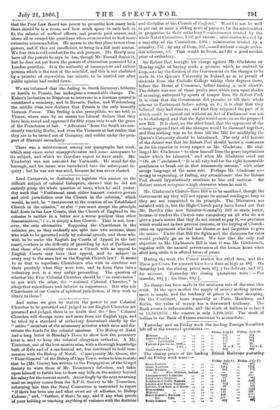Lord Carnarvon, in declining to legislate this session on the
difficult subject of colonial bishoprics, showed that he did not entirely grasp the whole question at issue, when he said yester- day week that tt Parliament must either reassert coercive powers and civil jurisdiction over the Church in the colonies," which would, he said, be " tantamount to the creation of an Established Church in the colonies," or else " you must accept the principle laid down in the Law Courts, that the -Church of England in the colonies is neither in a better nor a worse position than other denominations," i. e., is simply a free Church. That is not, how- ever, the only alternative. Supposing the Churchmen iu the colonies are, as they evidently are, split into two sections, those who wish to be governed solely by colonial synods, and those who wish to be under the English lay. Courts of Appeal in the last .resort,—where is the difficulty of providing by Act of Parliament that those who voluntarily choose a Church with an appeal to English Courts may have that appeal, and be subject in -every way to the same law as the English Church law ? It seems to us that to repudiate Churchmen who wish to continue out there precisely what they were here, and to force them into -voluntary sect, is a very unfair proceeding. The question of whether the Free Colonial Churches should be " in communion" or not with the other, the at national Colonial Churches," is altogether subordinate and inferior in importance. But why rob Churchmen of our Courts of spiritual jurisdiction, if they wish to .cleave to them ?






























 Previous page
Previous page